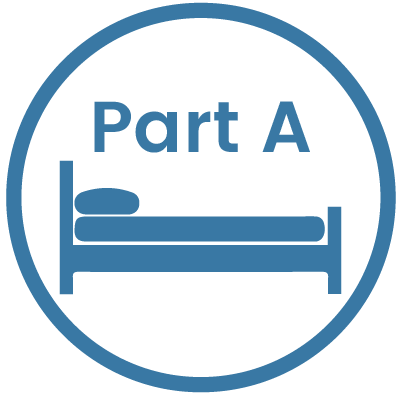Medicare Part A. What is Part A? How much does Medicare Part A cost? Do I need Part B in addition to Part A?

Part A is the original piece to the Medicare puzzle. What does Part A cover? Am I eligible for Part A?
Your Medicare questions answered.
Table of Contents
What Does Medicare Part A Cover?
Medicare Part A, the hospital portion, pays some of the following expenses.
- Inpatient care
- Hospice care
- Infusion therapy
- Cost of semi-private room
Hospital inpatient coverage includes hospital expenses that are medically necessary as part of your care. This includes items such as a semi-private room, meals, and medications. This care can be received through acute care hospitals, inpatient physical rehabilitation, critical access hospitals, mental health care, and a few other qualifying facilities.
Private room, personal care items, and private-duty nursing generally are not considered medically necessary and would not be covered by Medicare.
Part A claims are those INCURRED while an inpatient AND billed by the hospital.
Is Surgery Considered Inpatient Hospital Care?
Surgery can be performed as an inpatient or in an outpatient surgical facility.
You must be admitted to the hospital, as an inpatient, in order for surgery to be considered an eligible Part A charge. Surgery performed in the Emergency Room is an outpatient Medicare Part B charge.
If you receive a blood transfusion as a hospital inpatient, Part A does not cover the cost of your first 3 pints. Generally this is covered by a Medicare supplement plan.
In some cases, home health care may be covered by Part A. Your doctor must certify that your home health care is medically necessary and you are considered home-bound. Home health care services may include part-time skilled nursing care, physical therapy, occupation therapy, and so forth. It does not cover 24-hour home care, meals, or ADL (assistance in daily living).
A skilled nursing facility may qualify for Part A coverage. Current Medicare rules for SNF coverage say you must be discharged by the hospital directly to a skilled nursing facility or rehab center. You must have spent a minimum of 3 days as a hospital inpatient in order for your SNF bills to be covered.
Your doctor must certify that you need these services and cannot receive them at home. Medicare does not cover long-term care costs.
If your doctor certifies that you have a terminal illness with less than 6 months to live, you may be eligible for Part A to cover hospice care. You must agree to give up curative treatments for your illness to receive this coverage.
How Do I Enroll in Medicare Part A?
If you have been receiving Social Security benefits prior to age 65 you will be automatically enrolled in Part A in the month you turn age 65. If you have not been receiving Social Security you should apply during your IEP (initial enrollment period). This starts 3 months before your 65th birthday, the month you turn 65, and the 3 months following your 65th birthday.
If you have an HSA (Health Savings Account) and want to continue contributing to the account you may wish to delay enrolling in Part A.
If you do not qualify for premium-free Medicare Part A you could be subject to a late enrollment penalty if you miss the initial enrollment period.
Are you disabled and receiving SSDI (Social Security Disability Income)? If so, you will be automatically enrolled in Medicare Part A once you have received SSDI benefits for 24 consecutive months.
Some medical conditions may automatically qualify you for SSDI benefits. These include, but are not limited to, cardiovascular problems such as CAD, respiratory issues such as COPD, neurological disorders including Parkinson’s, immune disease including HIV, renal failure and so forth.